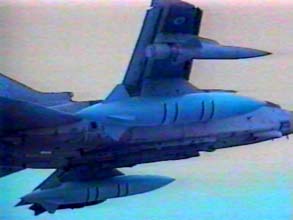Somebody switches on an old Garrard gramophone. The record's grooves slowly glide through the image. The person selects the last song. The needle drops into the groove and the languid first notes of a jazz classic are heard. Chet Baker starts to sing. Unavoidably you are overwhelmed by the atmosphere of melancholy that takes you with it in an indefinable desire. A desire that remains unfulfilled as the needle gets stuck halfway through the song. The record is started once more, but again this desire is shipwrecked on the cliffs of the grooves. Slowly but surely a threatening rumbling rises in the background and we discern the sound of planes flying overhead. Now the grooves of the record are replaced by fighter planes leaving deep tracks in the sky. These images of jet planes are almost as hypnotizing as the revolving record and the music's languid bass line. We see no images of horror or terror. No devastated cities, only an almost abstract ballet high in the sky. However, we can feel the merciless implications of these continuous sorties. Bombs and missiles slowly detach themselves and start on their journey down to the land far below. From the laid-back safe atmosphere where we could dream away without being threatened, we now find ourselves in the harsh reality of war. Beban takes us with her to her country of origin, Yugoslavia, where she was born in Novi Sad, one of the worst hit cities in the Kosovo war. She, like no other, feels this torn sentiment. The longing of the exile, the distance and the involvement, the disgust and compassion for the home country… what words are there to describe this? Let's Call it Love.
– Geert-Jan Strengholt |
Camera: Allessandro Scherillo
Sound: Ron Wright
Editing: Steve Sprung
Song: 'For Heaven's Sake', Chet Baker
Breda Beban, 1952, Novi Sad (Yugoslavia)
Lives and works in London (United Kingdom)
|
|
